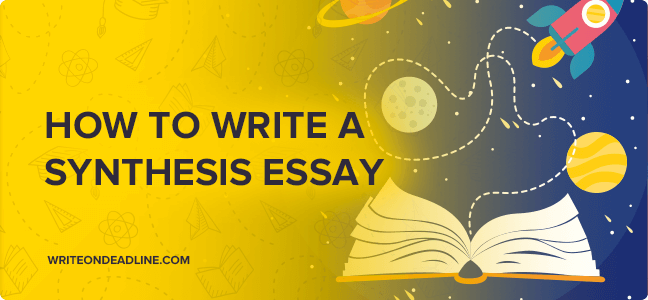How to Write a Synthesis Essay: The Informative Guidelines

Table of Contents
Introduction
What is a Synthesis Essay?
A synthesis essay is an academic composition that presents a unique viewpoint, integrating information from various sources. It requires the writer to build a connection between separate pieces of information, synthesizing them to support a central argument or idea.
Purpose and Importance
The synthesis process is central to academic writing, as it demonstrates a student’s ability to discern relationships between sources, extracting and merging diverse pieces of evidence to form a cohesive argument.
Understanding the Prompt
Breaking Down the Essay Prompt
- Read Carefully: Begin by reading the prompt multiple times to fully grasp what it is asking.
- Identify Keywords: Look for verbs like “analyze,” “argue,” or “compare,” which indicate the type of synthesis essay you are to write.
- Clarify the Task: Determine if you need to create your own thesis or if the prompt provides a specific viewpoint.
Identifying Sources and Relationships
- Source Evaluation: Ascertain the sources provided or required for your essay.
- Relationship Mapping: Sketch out the connections between different sources, noting similarities and contradictions.
Research and Source Selection
Choosing Credible and Relevant Sources
- Authority and Accuracy: Select sources from respected authors and publications.
- Currency: Ensure the sources are up-to-date and relevant to the current state of knowledge on the topic.
- Diversity: Include a range of viewpoints and types of sources (studies, articles, books, etc.).
Reading and Annotating Sources Effectively
- Active Reading: Engage with the text by asking questions and summarizing points.
- Annotation Techniques:
- Highlight key points and themes.
- Make marginal notes of insights and connections.
- Summarize each source’s main argument in your own words.
Developing a Thesis Statement
Crafting a Strong, Arguable Thesis
- Find a Stand: Your thesis should take a clear position on the topic.
- Ensure Arguability: A good thesis invites debate and isn’t just a statement of fact.
- Reflect Synthesis: Show how your thesis will weave together themes from your sources.
Relationship Between Thesis and Synthesis
- Central Argument: Your thesis is the central argument that will be supported by synthesized information from your sources.
- Guide for Synthesis: It directs how you’ll combine elements from the sources to build your argument.
Creating an Outline
Outlining the Essay’s Structure
- Introduction: Start with a hook, introduce the topic, and state your thesis.
- Body Paragraphs: Organize them by themes, points of argument, or source comparisons.
- Conclusion: Restate the thesis and synthesize the main points without simply summarizing.
Role of Each Section in a Synthesis Essay
- Introduction: Sets the stage and presents the thesis.
- Body: The core of the essay, where arguments are developed and sources synthesized.
- Conclusion: Reiterates the essay’s central argument and underscores the synthesis of ideas.
Writing the Essay
Paragraph Structure
- Introduction: Begin with a hook, provide context, and end with your thesis statement.
- Body Paragraphs: Start with a topic sentence, present evidence, include source synthesis, and conclude with a connection to the thesis.
- Conclusion: Summarize how the body has supported the thesis and provide a final thought.
Integrating Multiple Sources
- Paraphrase and Quote: Use a mix of paraphrasing and direct quotes to present source material.
- Multiple Viewpoints: Address different perspectives and relate them to your argument.
- Citation: Always properly cite sources to maintain credibility and avoid plagiarism.
Techniques for Synthesizing Information
- Cross-Reference: Show how points from various sources relate to each other.
- Thematic Organization: Group sources based on common themes that relate to your thesis.
- Critical Analysis: Don’t just list source details; explain their significance in context to your argument.
By methodically constructing each part of your essay, you ensure that the synthesis of information forms a compelling and persuasive narrative that supports your thesis.
Citing Sources
Guide on Citation Style
- Choose a Style: MLA, APA, Chicago, etc., depending on the discipline.
- In-Text Citations: Include author name and page number or year of publication within the body of the essay.
- Reference List: Provide a complete citation at the end of the essay for every source referenced.
Avoiding Plagiarism
- Crediting Ideas: Always attribute ideas to their original authors.
- Paraphrasing: When paraphrasing, ensure that you are genuinely rewording and not just changing a few words.
- Quotation Marks: Use for direct quotes and include an in-text citation.
Editing and Proofreading
Best Practices for Revising the Essay
- Take a Break: Step away from your essay before revising to see it with fresh eyes.
- Read Aloud: This can help catch awkward phrasing and errors that you might miss when reading silently.
- Peer Review: Have someone else read your work to provide feedback.
Checks for Grammar, Clarity, and Logical Flow
- Grammar Checkers: Use tools like Grammarly or Hemingway App for initial checks.
- Clarity: Ensure each sentence is clear and contributes to your argument.
- Logical Flow: Verify that each paragraph transitions smoothly to the next.
Conclusion
Crafting a Compelling Conclusion
- Restate Thesis: Begin by restating your thesis in a new way.
- Synthesize Main Points: Briefly summarize how your body paragraphs support the thesis.
- Final Thought: End with a strong closing statement that emphasizes the importance of your synthesis.
Reflecting on the Synthesis Process
- Learning Experience: Consider what the process taught you about connecting ideas.
- Scholarly Contribution: Reflect on how your synthesis provides value to the topic of discussion.
- Future Implications: Suggest areas for further research or implications of your findings.
The conclusion is your last opportunity to make an impact on the reader, so ensure it solidly reinforces your thesis and demonstrates the intricate process of synthesis that has woven through your essay.

